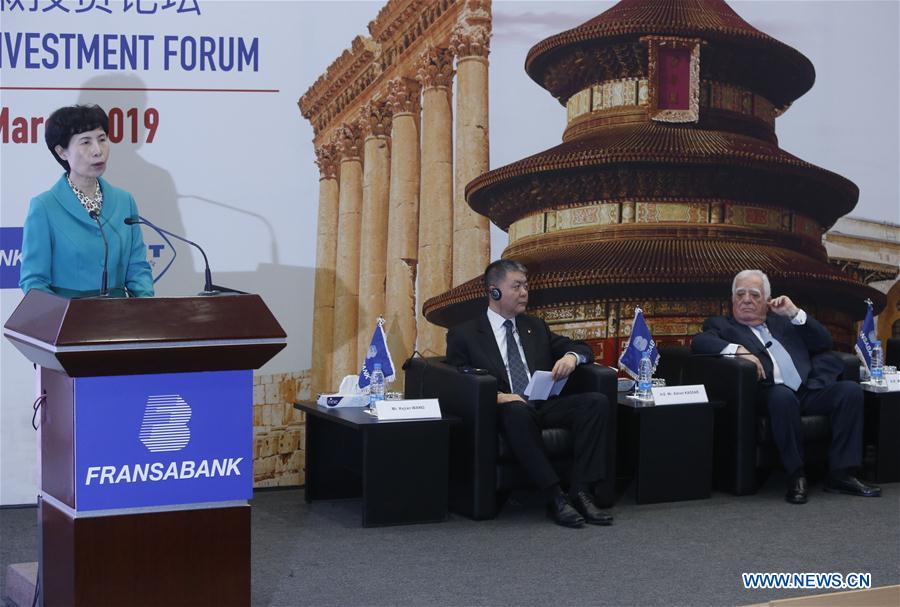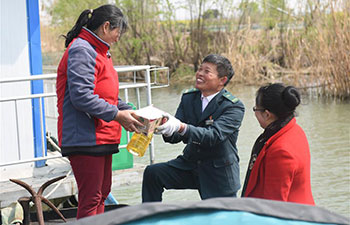
Gao Yan (L), chairwoman of China Council for the Promotion of International Trade (CCPIT), speaks during the China Lebanon Investment Forum in Beirut, Lebanon, March 30, 2019. Gao Yan, chairwoman of China Council for the Promotion of International Trade (CCPIT), announced on Saturday the opening of an office for CCPIT in Lebanon. "CCPIT in Lebanon will cooperate with Lebanese chambers to improve commercial and trade ties between Lebanon and China," Gao said. She added that China is Lebanon's largest trade partner and her country is keen on maintaining this position in the coming years. Gao's remarks came during the China Lebanon Investment Forum which aimed at drawing a roadmap for the future of cooperation between Lebanon and China on various levels. The event, which took place at Adnan Kassar Edifice for Arab Economy in Beirut, saw the participation of Lebanese officials, the Chinese Ambassador to Lebanon Wang Kejian and representatives of the economic sectors in Lebanon and China. Gao also signed two memorandums of understanding with Lebanese officials for promotion of Chinese investment and collaboration on Lebanon's industrial zones and the creation of the China Arab Arbitration Center. (Xinhua/Bilal Jawich)
BEIRUT, March 30 (Xinhua) -- Gao Yan, chairwoman of China Council for the Promotion of International Trade (CCPIT), announced on Saturday the opening of an office for CCPIT in Lebanon.
"CCPIT in Lebanon will cooperate with Lebanese chambers to improve commercial and trade ties between Lebanon and China," Gao said.
She added that China is Lebanon's largest trade partner and her country is keen on maintaining this position in the coming years.
Gao's remarks came during the China Lebanon Investment Forum which aimed at drawing a roadmap for the future of cooperation between Lebanon and China on various levels.
The event, which took place at Adnan Kassar Edifice for Arab Economy in Beirut, saw the participation of Lebanese officials, the Chinese Ambassador to Lebanon Wang Kejian and representatives of the economic sectors in Lebanon and China.
Gao also signed two memorandums of understanding with Lebanese officials for promotion of Chinese investment and collaboration on Lebanon's industrial zones and the creation of the China Arab Arbitration Center.
Rayan Kouatly, secretary general of the Lebanese Arbitration Center, emphasized the importance of the establishment of an arbitration center to solve legal disputes to boost business cooperation.
Union of Arab Chambers Honorary Chairman Adnan Kassar described the initiatives taken during the event as a new official beginning for building strong Lebanese-Chinese relations.
"CCPIT chairwoman chose Lebanon as the first official visit's destination in the Arab world which is a great honor for our country ... Lebanon plays an important and strategic role in the Belt and Road Initiative," Kassar said.
Proposed by China in 2013, the Belt and Road Initiative refers to the Silk Road Economic Belt and the 21st Century Maritime Silk Road, and aims to build a trade and infrastructure network connecting Asia with Europe and Africa through the ancient trade routes of the Silk Road.
Lebanese and Chinese officials emphasized during the event the importance of boosting ties between the two countries in various areas.
"We have to be committed to increasing ties between the two countries in different areas which will have a positive impact on the peoples of China and Lebanon," Gao said.
Gao emphasized the need to increase mutual investments while inviting Lebanese companies to take part in exhibitions in China.
She also called upon Chinese companies to invest in Lebanon's industrial zones which will increase the country's exports while expanding Middle East markets.
Meanwhile, Lebanese Telecommunications Minister Mohammad Choucair, representing Prime Minister Saad Hariri, said that Lebanon hopes to create trade balance with China.
Choucair added that Lebanon is preparing to launch a set of new projects within the framework of CEDRE, an international conference supporting Lebanon with 11 U.S. billion dollars in loans and donations to revamp the country's ailing infrastructure and bolster its economy.
"We call upon Chinese companies to partner with Lebanese businesses to implement these projects. We, from our side, promise to offer all the needed facilities for this purpose," he said.















